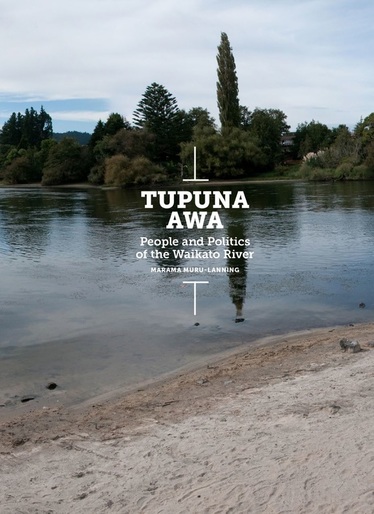
Tupuna Awa: People and Politics of the Waikato River
by Marama Muru-Lanning
The title, Tupuna Awa, is key to the content of this book. To the people who identify closely with it, the Waikato river is not Te Awa Tupuna, merely their ancestral river, but Tupuna Awa – a tribal ancestor, their River Ancestor.
The author, Dr Marama Muru-Lanning, an anthropologist with both personal and academic expertise in the subject, is ideally suited to produce this learned and readable account of competing discourses to do with this important waterway.
It is a book that deserves to be read widely, for its explanations of attitudes, political stances and positions regarding complex issues that that have involved the river in recent times, including a history of claims and outcomes.
On the latter, there is detailed description of key events – such as the dynamics of the public signing ceremony of the 2008 Deed of Settlement in Relation to the Waikato River, and the later pan-tribal water hui at Turangawaewae.
Readers less interested in the specifics of legislation regarding recent schemes to do with te awa, and wanting elaboration on feelings involved, will gain from content that deals with the different cultural/ethical aspects of Dr Muru-Lanning’s research. This includes the reconciling of the spiritual and academic approaches. As such, it could be a useful preparatory text for anyone engaged in formal or more casual study of landscape, history and politics.
For general readers, probably the majority of New Zealanders, chapters 3 and 4 particularly provide background information about key issues at the basis of discussions – most importantly, tribal identity as opposed to the politics of commercial interests. “Mapping River Culture” gives a summary of the river from geographical, tribal, spiritual, historical, political, mythological, and commercial viewpoints.
In “Different Understandings of ‘Owning’ the Waikato River’, there is explanation of Maori viewpoints and English-based law.
Maps, diagrams, and sixteen pages of coloured photos support the text.
Overall, this is a book that meets several needs. It is an academic study that is fully supported by detail provided in appendices, glossary, extensive scholarly references, and index. At the same time it is accessible to a broader readership of those who wish to gain more understanding of ongoing debate about New Zealand’s longest river.
by Marama Muru-Lanning
The title, Tupuna Awa, is key to the content of this book. To the people who identify closely with it, the Waikato river is not Te Awa Tupuna, merely their ancestral river, but Tupuna Awa – a tribal ancestor, their River Ancestor.
The author, Dr Marama Muru-Lanning, an anthropologist with both personal and academic expertise in the subject, is ideally suited to produce this learned and readable account of competing discourses to do with this important waterway.
It is a book that deserves to be read widely, for its explanations of attitudes, political stances and positions regarding complex issues that that have involved the river in recent times, including a history of claims and outcomes.
On the latter, there is detailed description of key events – such as the dynamics of the public signing ceremony of the 2008 Deed of Settlement in Relation to the Waikato River, and the later pan-tribal water hui at Turangawaewae.
Readers less interested in the specifics of legislation regarding recent schemes to do with te awa, and wanting elaboration on feelings involved, will gain from content that deals with the different cultural/ethical aspects of Dr Muru-Lanning’s research. This includes the reconciling of the spiritual and academic approaches. As such, it could be a useful preparatory text for anyone engaged in formal or more casual study of landscape, history and politics.
For general readers, probably the majority of New Zealanders, chapters 3 and 4 particularly provide background information about key issues at the basis of discussions – most importantly, tribal identity as opposed to the politics of commercial interests. “Mapping River Culture” gives a summary of the river from geographical, tribal, spiritual, historical, political, mythological, and commercial viewpoints.
In “Different Understandings of ‘Owning’ the Waikato River’, there is explanation of Maori viewpoints and English-based law.
Maps, diagrams, and sixteen pages of coloured photos support the text.
Overall, this is a book that meets several needs. It is an academic study that is fully supported by detail provided in appendices, glossary, extensive scholarly references, and index. At the same time it is accessible to a broader readership of those who wish to gain more understanding of ongoing debate about New Zealand’s longest river.
Flaxflower Review by Paua Blue
Title: Tupuna Awa: People and Politics of the Waikato River
Author: Marama Muru-Lanning
Publisher: Auckland University Press
ISBN: 9781869408503
RRP: $49.99
Available: bookshops
Author: Marama Muru-Lanning
Publisher: Auckland University Press
ISBN: 9781869408503
RRP: $49.99
Available: bookshops
No comments:
Post a Comment